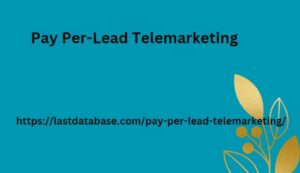Helping institutional investors make efficient decisions
In today’s rapidly changing financial markets, the speed and accuracy of information acquisition often determine the success or failure of an investment. Buy-side contact databases have emerged as an important tool for institutional investors to discover potential investment targets and obtain contact information for key decision makers. This article will explore the advantages and applicable scenarios of the buy-side contact database and share practical suggestions for selecting database vendors to help institutional investors conduct investment activities efficiently.
Buy-side contact database overview
The buy-side contact database is an electronic information.
Library containing a large amount of information on institutional investors and their investment professionals. These databases usually contain the following information:
Institution name
Institution type (e.g., investment Pay Per-Lead Telemarketing bank, asset management company, hedge fund, etc.)
Investment strategy (e.g., value investment, growth investment, fixed income investment, etc.)
Asset size
Contact name and position (e.g., investment manager, analyst, fund manager, etc.)
Contact information (e.g., phone number, email address)
Investment cases (may be provided in some databases)
Advantages of the Buyer Contact Database
The Buyer Contact Database brings the following significant advantages to institutional investors:
Efficiently discover investment targets: Through Demystifying Vietnamese Phone Numbers: A Guide the screening function, institutional investors can accurately locate potential investment targets based on investment strategies, asset size and other conditions, such as unlisted companies and start-ups that meet their investment standards.
Get the contact information of key decision makers: The Buyer Contact Database contains the contact information of key decision makers, such as investment managers, fund managers, etc., to help institutional investors communicate directly with decision makers, improve communication efficiency, and seize investment opportunities.
Understand investors’ investment preferences: Through the database, you can understand the investment strategies, investment cases and other information of different institutional investors, helping institutional investors better understand the dynamics of the investment market and formulate more targeted investment strategies.
Establish investor relations: Using the buyer contact database, you can proactively establish contact with potential investors, promote investment projects, and improve fundraising efficiency.
Save time and cost: Traditional investment target discovery and investor relationship maintenance are often time-consuming and laborious. Using the buyer contact database, institutional investors can quickly obtain a large amount of accurate information, reduce research costs, and improve work efficiency.
Applicable scenarios of the buyer contact database
The buyer contact database is applicable to a variety of investment activity scenarios, such as:
Private equity investment (PE): Institutional investors look for unlisted companies and start-ups that meet their investment criteria and establish contact with investment decision makers.
Venture capital (VC): Venture capital institutions look for early-stage entrepreneurial projects that meet their investment direction and communicate with founders or investment managers.
Investment banking underwriting (ECM): Assisting companies to issue stocks or bonds requires establishing contact with potential institutional investors and promoting investment projects.
Asset management companies: Asset management companies use the database to find investment targets that meet their investment strategies and communicate with investment managers to understand the latest situation of investment targets.
Investor relationship maintenance: Listed companies use the database to keep in touch with institutional investors, disclose company information in a timely manner, and enhance investor confidence.
Considerations for selecting a buy-side contact database vendor
Institutional investors should consider the following factors when selecting a buy-side contact database vendor:
Data quality: Data quality is the primary factor in selecting a database vendor. Ensure that the database information is accurate, updated in a timely manner, and includes the latest contact information of key decision makers.
Coverage: Choose a database with appropriate coverage based on the investment areas of the institutional investor. For example, an investment institution focusing on the Chinese market can choose a database covering Chinese institutional investors.
Update frequency: Choose a database with a high data update frequency to ensure that the latest investor information is obtained and grasp market trends.
Data analysis function: Some database vendors provide data analysis functions, such as classifying investors according to investment strategies, asset size and other conditions, to help institutional investors develop more targeted investment strategies.
Price: The price of the buy-side contact database varies depending on the features offered,
The number of contacts included, and the update frequency. Choose a database with a price that matches the features.
Compliance: Choose a database vendor that complies with local laws and regulations, for example, ensure that the database information comes from a legal source and does not contain personal information collected in violation of regulations.
Recommended suppliers of well-known buy-side contact databases
The following are some well-known suppliers of buy-side contact databases for reference only:
Preqin
Preqin is a world-renowned alternative investment data provider with a global institutional investor database, including investor information in the fields of private equity, venture capital, and real estate investment.
Thomson Reuters SDC Platinum
Thomson Reuters SDC Platinum is another well-known institutional investor database that covers institutional investor information around the world and provides powerful data analysis capabilities.


